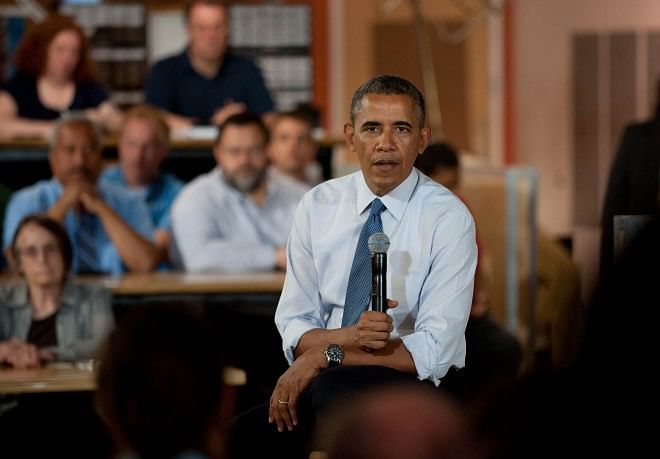US president can 'bypass Congress'
US president can 'bypass Congress'

Barack Obama and US political leaders believe the president does not need Congress' permission to take certain measures to quell the al Qa'ida-inspired uprising sweeping through Iraq, the Senate's top Republican and others have said.
But the prospect of the president sidestepping Congress raises the potential for clashes between the White House and rank-and-file politicians, particularly if Obama should launch strikes with manned aircraft or take other direct military action in Iraq.
Administration officials have said air strikes have become less a focus of recent deliberations but have also said the president could order such a step if intelligence agencies could identify clear targets on the ground.
Obama huddled in the Oval Office for over an hour to discuss options for responding the crumbling security situation in Iraq with Democratic senate majority leader Harry Reid, Republican senate minority leader Mitch McConnell, Republican House of Representatives speaker John Boehner, and Democratic house minority leader Nancy Pelosi.
Speaking to reporters later, McConnell said the president "indicated he didn't feel he had any need for authority from us for steps that he might take".
Pelosi agreed with the president, saying in a statement after the meeting that Obama did not need "any further legislative authority to pursue the particular options for increased security assistance discussed today". She did not specify what options were discussed.
An administration official said it was the leaders who suggested Obama already had existing authorities to take additional action in Iraq without further congressional permission. The official downplayed the notion that the president agreed with that assessment, saying only that he said he would continue to consult politicians.
White House has publicly dodged questions about whether Obama might seek congressional approval if he decides to take military action. Last summer he sought approval for possible strikes against Syria, but scrapped the effort when it became clear that politicians would not grant him the authority.
But administration officials have suggested that the president may be able to act on his own in this case because Iraq's government has requested US military assistance.
In addition, an authorisation for the use of military force in Iraq, passed by Congress in 2002, is still on the books and could potentially be used as a rationale for the White House acting without additional approval. Before the outburst of violence in Iraq, Obama had called for that authorisation to be repealed.
White House officials offered no timeline for how soon Obama might decide on how to respond to the fast-moving militants from Isis, which has seized Mosul, Tikrit and other towns in Iraq as the country's military melted away.
Obama's decision-making on air strikes has been complicated by intelligence gaps that resulted from the US military withdrawal from Iraq in late 2011, which left the country largely off-limits to American operatives.
Intelligence agencies are now trying to close gaps and identify possible targets that include insurgent encampments, training camps, weapons caches and other stationary supplies, according to US officials.